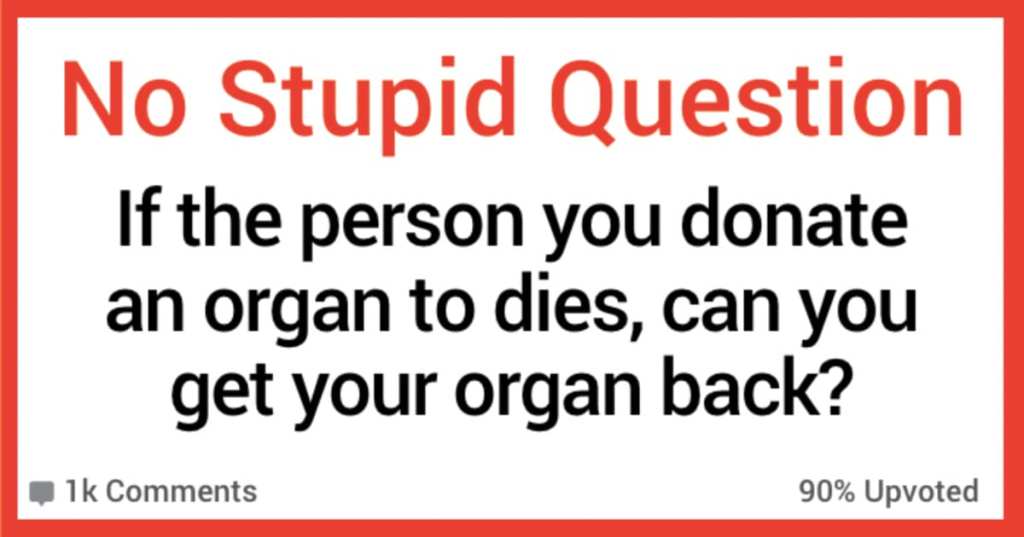Organ donations is one of those subjects that people tend to be passionate about, and for good reason -it is, after all, life and death. As someone whose sister is alive because of a donor, I have feelings of my own.
All of those feelings aside, though, this guy wonders what happens if you donate as a living donor only to have the person die from some other cause.
Can you get your organ back? Would you want it? The people of Reddit have his (and your!) answers.
13. There are such good people out there.
I’m a living donor.
No, I couldn’t get the organ back. The risk isn’t worth the benefit, surgeons wouldn’t do it.
If the organ was still viable I’d rather someone who needed it got it anyways.
12. Your organ might not be up for it.
Organ donation is extremely taxing on the organ and the risk would be too great to put it back for little gain.
11. Keeping it in the family.
I remember reading about a case where a father donated bone marrow to his son (or vice versa) and then years later the father needed a bone marrow donation so the son donated back to his father (or vice versa).
10. Technically…
You give up all rights to the organ when under going the procedure.
With that said, technically, you could donate the organ successfully, have the recipient die, then have the organ successfully re-implanted.
However, the surgery – and what your body goes through – is brutal. The organ and/or you would likely not survive.
9. No take backs.
Seems counterintuitive, but the donor was already determined to not need the organ so it makes no sense to put it back with such a large risk associated with the surgery – it’s more worth the risk putting it into someone who would die anyway without the organ
8. In the case of a kidney, you might need it some day.
That kidney and I have been through a lot together.
Breakups. Births and deaths of loved ones. Holidays and birthdays. That time we drank an entire fifth of Ice 101 and fell down the steps.
I miss him.
7. It’s already tough enough.
You don’t get it back even if the recipient dies during the transplant. Source: my husband was considered to be a living transplant donor for a family member in liver failure. Part of the screening process is doing a mental evaluation to see if the donor is strong enough to handle a situation where the recipient dies during the transplant.
Apparently, donating an organ is mentally taxing on an individual bc part of the healing process is prolonged fatigue and depression while the liver regenerates. Combine that with the death of a loved one and the feeling of failure and there could be trouble.
6. An actual reason why not.
I’m a transplant recipient and I’m not eligible to donate anything in the future. Not even blood. I’m good this is due to the medications we take.
5. This is an amazing tale.
I’m a living donor. I donated 64% of my liver to a stranger. Fatigue is part of the recovery from any surgery and is to be expected. I just napped a lot. Depression is a possible result of donation. They screen very carefully to limit this.
In particular, you’re likely not going to be permitted to donate if you have a history of mental illness/depression. Also if you think donation is going to change or improve your life, give you a turning point, change the way other people think about you, or give you karma. You donate, you recover from surgery, life goes back to normal. There’s no epiphany.
In my case, since I was not donating to anyone I know, the risks of mental impact to me were reduced. I didn’t have to think about the welfare of a loved one who had received the transplant or any of the complications if the transplant didn’t go well.
I’m back to 100% with an awesome scar to show for it. As far as I’m aware my recipient is alive and well. He would not be without a donated liver.
Donation isn’t for everyone but those who are interested and capable should look into it.
4. Why not you?
Not 100% true.
A slightly different scenario, but there have been kidneys that have been donated,, the recipient passed away, and the kidney was re-donated to a second recipient.
3. You don’t know what it’s been through.
I think the better question would be would you WANT the organ back?
There might be many reasons why you might not want it back. Illness, drugs in the system whether legal or illegal, alcohol misuse.
There might be a lot of reasons to just be without it.
2. We’re uncovering more questions.
Good to hear organs will still be used if they are not currently in their original host.
This begs another question of what is the maximum number of recipients a single organ could have though…
1. It would be weird.
I heard of someone that requested it but they didn’t end up getting it.
1) doctors refused to put it back due to risk of infection,
2) technically the individual gave up rights to it and the family of the individual who died would have to consent, which they opted for a hard no.
Not sure what would’ve happened if they consented or if laws have changed since then
This is kind of a weird question to me. Like. It’s been in someone else’s body now, so I feel like they can keep it.
What are your thoughts? Drop them in the comments!






